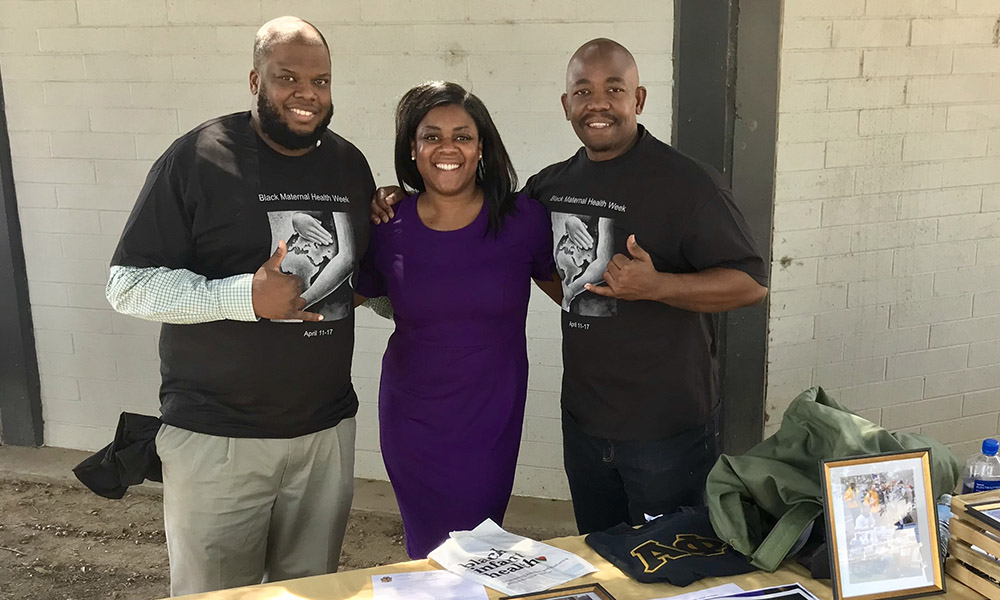
Shantay Davies-Balch (middle) supporting Black Maternal Wellness Week with members of the Iota Nu Lambda Alumni Chapter of Alpha Phi Alpha, Inc. the first Black intercollegiate Greek-letter fraternity which has been committed to community service since its establishment at Cornell University in 1906 (Photo courtesy of Shantay Davies-Balch).
California Forward is committed to advancing policy intersections that create a more inclusive and sustainable California where all people can prosper. To move this forward, we must reimagine a state where we address the racial and geographic inequities that have been exacerbated by a public health and economic crisis, and we must answer the call to dismantle structural racism. The Voices of Shared Prosperity series amplifies the stories of Californians who are committing their time and talent to solutions that embrace equity, environmental sustainability, and economic opportunity.
“There is definitely a plan and a vision in place to upskill, cross skill and cross mobilize to serve our community in a way that looks culturally respectful and is sustainable,” shared Shantay Davies-Balch, president and CEO of BLACK Wellness & Prosperity Center (BWPC), as she spoke about the purpose of BWPC in the Central Valley.
Davies-Balch’s commitment to transforming healthcare for Black communities in the Central Valley is evident through her career and leadership. In addition to her role with BWPC, she serves as the director of the COVID-19 African-American Coalition, a product of the COVID-19 Equity Project. The Coalition works in collaboration with health professionals to bring an intentional racial equity strategy to the COVID-19 response in Fresno County.
The purpose of BWPC is to build infrastructure and capacity within the Black community, specifically through maternal wellness. A veteran maternal health professional, Davies-Balch supports economic and community development strategies that start early. “If we don’t invest at the beginning to address our systems, we will have continuous economic oppression for our general society.”
| Black Californians are approximately 12% less likely to live in prosperous neighborhoods, areas with less than twenty percent of the population below the federal poverty line, than other Californians. Less prosperous neighborhoods typically have lower access to critical neonatal and other healthcare. Learn more about the Prosperous Neighborhood indicator and the broader California Dream Index here. |
|---|
In launching BWPC, Davies-Balch designed the organization to support and train a Black workforce that is mobilized to provide outreach and education on issues including preterm birth, lactation support, STDs, COVID, and more. “[These roles], which created approximately 50 jobs for Black community-based healthcare workers, were designed to be a sustainable fabric in the Fresno community, positioned to respond to, and work with the Public Health Department,” Davies-Balch shared.
She has been a longtime advocate of this work. While in high school Davies-Balch became increasingly more aware of negative birth outcomes that had been normalized in the Black community. She recalled thinking “the solutions that I see, that are being offered, are not addressing any root causes – I don’t see anything that is being changed.” This motivated her decision to pursue a career in healthcare administration in order to influence decision-making and policy development.
An avid supporter of volunteer and training opportunities, Davies-Balch credits her volunteerism with catapulting her career after she returned to school. As a young working mother, she spent a lot of time volunteering because traditional internships were too restrictive for her schedule. Attributing a significant component of her success to the relationships she developed while serving as a volunteer, she encourages others to prioritize these opportunities.
She earned her bachelor’s degree in healthcare administration from Fresno Pacific University and her MBA from Johns Hopkins University in hospital management. Davies-Balch has provided regional leadership through her role as a former Maternal Child Health Director for March of Dimes and as a regional liaison for the United Health Centers – Women Infants and Children division.
In order to shift the tide in health care in the Black community, Davies-Balch insists that maternal wellness is the most formidable opportunity. Pointing to the CDC’s identification of racism as a public health threat, she stresses the importance of culturally congruent care in serving Black communities. Given the positive benefits of culturally competent doula care, she supports models that fund trained community-based doulas for hospitals serving Black women. She also identifies this as an important economic development strategy designed to show value for the important contributions of community-based support.
Davies-Balch is dedicated to prioritizing early investments in maternal care to address disparities in the social determinants of health. “I work on public health issues and I hope to achieve [necessary structural change] by understanding and knowing how to relate to and talk to the systems that I would like to influence.” She continues to use her time and talents to address health equity in the Central Valley today and for generations to come.
The Voices of Shared Prosperity stories will be shared in advance of the 2021 California Economic Summit taking place on November 9-10.

